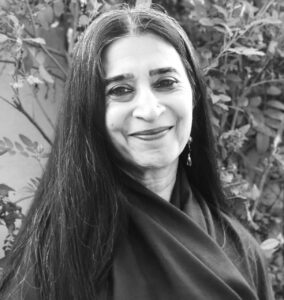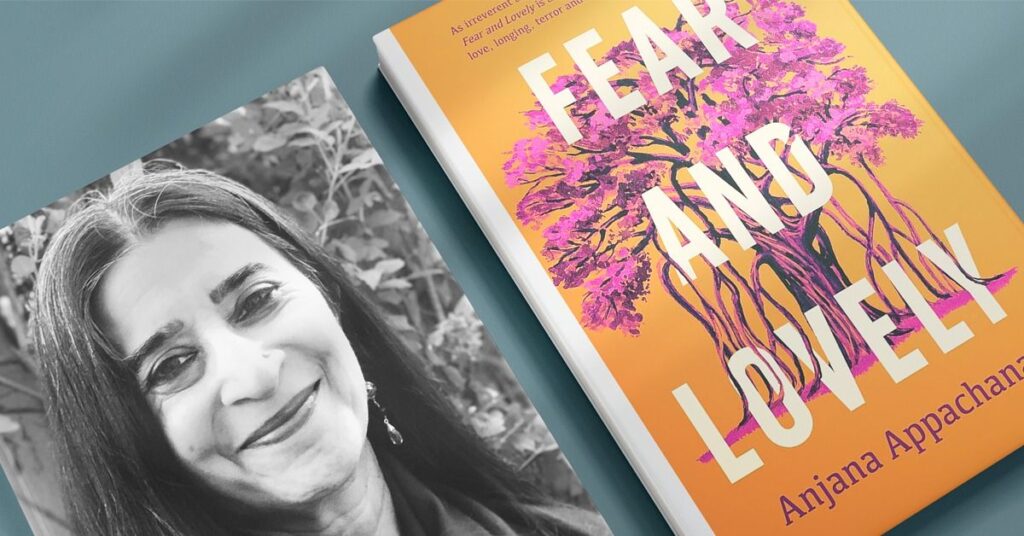Hey there, fellow book enthusiasts and curious minds! Get ready for an exciting journey into the heart of “Fear and Lovely” by the talented Anjana Appachana. We’re about to embark on a rollercoaster of emotions and secrets, so buckle up and join us for a chat that’s going to make you want to dive right into this gripping story! We had fun interviewing her, but before we dive into her interview, here are some words by the author, herself.
Thank you for your interest in Fear and Lovely.
Preliminary to answering your questions, I’d like to say that I’m the last person who can speak coherently about what my novel is about, what Mallika’s journey represents, or the significance of using multiple perspectives. I believe a discerning reader can answer these questions better than me. These are not the things I’m thinking of when I write; I’m thinking about my characters. My entire involvement is in their world, their dilemmas, their relationships, their secrets, the choices they make and the struggles inherent in those choices.
No, without further ado, lets go ahead.
Mili: The story revolves around Mallika, who battles with depression and memory loss while keeping her mental illness a secret from her community. How does Mallika’s journey represent the broader theme of mental health stigma in society, particularly in close-knit communities like the one in New Delhi?
Anjana: I had no idea I’d be writing about mental health. I’m very glad that I did, but I hadn’t planned it. The prologue which speaks of it right in the beginning of the book was written and re-written much later, when I was more than half-way through the book. As I wrote about what Mallika went through, I found her spiralling into a deep depression, which had to be hidden, since this was the seventies when no one talked about mental health. In fact, the term “mental health” was never used. You were crazy or nuts or mental or paagal or cracked. I had great compassion for Mallika as well as for her mothers, father and Ayah-ji who loved her so deeply and suffered as much as she did, and perhaps more, because one suffers more for one’s child than one does for oneself. However, I think that in some ways my story is as much about love as it is about mental health or other aspects of suffering. Had Mallika not been loved and protected so fiercely by her immediate family she may never have recovered. Society can be cruel, no less now than then. And suffering is inherent in anything that one is compelled to be silent about. Once, mental health issues were shrouded in silence. Now, forty-five years later, while there is more of a conversation about mental health, many still tend to hide it because the consequences for speaking or living your truth can be terrible. It can be wonderful too, but that usually comes later. It doesn’t matter whether you live in the 1970’s or in the 2020’s – there are plenty of truths that are hidden. There always will be.
Mili: The narrative unfolds through the perspectives of Mallika and seven individuals close to her, each hiding their own truths and struggles. Can you discuss the significance of using multiple perspectives to tell the story? How does it contribute to the reader’s understanding of the characters and their interconnected lives?
Anjana: I cannot speak for the reader. But I can speak as a writer. This book was initially written from only one perspective – Mallika’s. The book never took off, so I put it away. However, the characters refused to leave me. So I gave myself an experiment to write a few pages from the perspective of different characters in the book, just to get my creative juices flowing. As I gave voice to eight of these characters, I found myself fascinated by how different they were, by how little I knew them, and by how much I wanted to know them. This experiment – of writing a few pages from the voices of different characters – became the book, Fear and Lovely. I found how different the characters were from one another, how each viewed life, how they perceived one another, and how there is no such thing as “the” truth. Each character has her or his truth. I was fascinated by all their different truths. It took me time to get to know them. Using multiple perspectives allowed the story to be held aloft by many loving hands. Mallika alone couldn’t have borne the weight of this story and the many themes that it encompasses. It was a joy for me to examine the same things from different perspectives. I felt I was in the company of eight very dear friends.
Mili: Secrets and silences seem to play a pivotal role in the lives of the characters in “Fear and Lovely.” What do these secrets reveal about the complexities of relationships and the human experience? How do these secrets impact the characters’ journeys throughout the narrative?
Anjana: As far as I’m concerned, everyone has secrets and silences, big and small. Silences are complex – you may not even know that you’re silent about something. There must be a context to understand silence. In ‘70s India for many young people, there was no context. When there’s no context, then there’s no comprehension; you may not even be aware that you are silent about something. Often, how these silences affect your life is something you realize only decades later. The time hasn’t come for my characters to realize the enormous consequences of their silences. That is a longer journey that is more complex than merely “getting to know” someone’s secret.
| ALSO READ: Interview with Edelweis Ritt |
Mili: The book is set in New Delhi, a city rich in culture and tradition. How does the setting influence the characters’ actions and the unfolding of the story? Can you elaborate on how the cultural backdrop adds depth to the narrative and the characters’ struggles?
Anjana: While I do have a setting, I don’t focus on that. My focus is on the internal landscape of my characters, not the external one. That is the terrain I find fascinating. I find silences and secrets very, very interesting. And since I love my characters, I find myself completely involved in their lives, their loves, their silences and their struggles. I think that would be the case whether my characters are based in the nineteen seventies or the two thousand twenties.
Mili: Is there any particular book that influenced you to become an author?
Anjana: Every book I have loved since I was five years old has influenced me and I’ve lost count of how many books I’ve loved since I was five!
Mili: Your book Fear and Lovely is written in a humorous tone, why you chose this lighter tone to deal with a deep plot? What inspires you to make such decisions?
Anjana: That’s such an interesting question. And, truthfully, your question doesn’t have an easy answer. When I began my experiment with the eight voices in the book, I found I was using a lighter tone. I think that was because I began the story by exploring the daily lives of my six young characters. I found it to be a terrain filled with the lightness and sweet ignorance of youth. Because my characters were so young and I am not, I found myself viewing their lives with a great deal of love and amusement. I partook of that youth, that silliness and those happy days. It became my world. But then, as I continued writing I found myself encountering their silences, and of course, I had to find out what these silences were.
The issues my characters are silent about are not at all funny. They suffer deeply, but don’t always know that they are suffering, and they certainly don’t understand their suffering. I found myself balancing the humour of their daily lives with the complexity of their suffering. They can’t look at their suffering, let alone address it. In the prologue Mallika speaks about her mental breakdown using the vocabulary of a society that condemns you for being mentally ill. Since Mallika has gone through severe depression, she deliberately speaks of it in that tone, and with dark humour. Dark humour about her own experience is her way to address the experience in the prologue. But mostly, humour is used in the story for the lighter parts of their lives. I don’t believe I have diminished the suffering of my characters by using humour. Because life is both funny and tragic, isn’t it?
Mili: Tell us only one book that you can pick up any day and could read again and again?
Anjana: The Measure of my Days by Florida Scott Maxwell (non-fiction). I dip into it every now and then and discover something new every time. She was in her 80’s when she wrote it, and it is such a passionate and wise book.
Mili: Your favourite 3 books?
Anjana: Impossible to say! I have more than a hundred favourite books! So I’ll just mention one – the Mahabharata.

And there you have it, folks! Our chat about “Fear and Lovely” has come to an end, but the adventure within its pages is just beginning for you. So, grab a copy, cozy up with a cup of tea or coffee, and let this captivating story take you on a whirlwind of emotions. Remember, books are like hidden treasure chests waiting to be opened, and this one is filled with mysteries and revelations that you won’t want to miss. You can find the review of the book ‘FEAR & Lovely’ HERE.
Happy reading!
Buy the Book Here


I think it’s so interesting how an author can try to put away characters, but they just keep coming back until their stories are told. I loved this interview.
I love that the book is set in New Delhi. I tend to enjoy books that are written in a humorous tone.
This is a book that I need to read, I have struggled with mental health issues too.
This sounds like such a great book, and very relatable. I absolutely think there is a mental health stigma and I’m sure many people can relate to hiding things like depression. Great thoughts from the author and I’m glad I learned of this book.
It’s refreshing to see an author delve into such important topics with humor and grace, balancing the lighter aspects of life with the depth of human suffering. Your exploration of multiple perspectives adds layers of richness to the narrative, making it even more engaging and thought-provoking.
It sounds like the book has a focus on a difficult topic, especially for the time it is based in allowing for a range of scenarios to occur. I’m sure it will be an interesting although emotional read as we hear about the difficulties Mallika experiences.
I’m a big fan of character-driven stories so this is one I’ll definitely be putting on my reading list.
I love books where the characters are the stars. All characters move a story, but some books really dig into the characters, and that’s what I love. I’ll have to check this out.
Wow! What a really nice book this is, I’m a fan of character driven stories. Can’t wait to check this out
My friend struggles with Mental Health and I think this book would be helpful for her to read. Thanks for sharing this!
You have the best interviews with authors and I enjoy meeting your new ones! The characters she develops would intrigue me!
How interesting to get the author’s point of view on things. Thank you for sharing this interview. I love that the author chose to write about a serious topic while still keeping it humorous and lighthearted. I feel like it allows the reader to enjoy the story and learn. I know those more serious topics can sometimes be overwhelming for some.
What a fascinating author! She seems to be able to create real characters – and I am certainly checking out her work. You must have enjoyed the interview.
Thank you very much for sharing this interview with us! It is great to hear about it.
This book sounds like a captivating read. I’ll add to my must read list. Great author interview!
I like how you always recommend books to us!
I need to read this one. I think it sounds like it would be an interesting read.
liked reading your post as this sounds like a great book and the interview was great thanks for sharing
This sounds like a really great and interesting book that I need to check out! Thanks for sharing this with us
I love reading! And after this interview, the “Fear and Lovely” book is on my reading list!
This is a lovely interview with the author. The book sounds like a really great read, I will have to pick up a copy!
I really need to read this book. It looks really great can’t wait to check this out
This sounds like a book I would like to read, and found it interesting to read how the author brought the books to life
This sounds like a good read. I love reading books from authors I’ve not heard of before.
This sounds like a great read and enjoyed reading over the interview too. I do love a good book and will add this one to my kindle wishlist 😉
I’ve read and seen how mental health is affecting people. I’m glad that she wrote about it. This would be an interesting read.
Aawww….these are the kinds of books I wanna read. Writing about mental health struggles can be scary to the reader but it also opens up their minds to how real this is, in real life.
I’m thrilled to dive into “Fear and Lovely” after reading this enticing introduction! ✨ Anjana Appachana’s storytelling promises to take us on an emotional rollercoaster filled with secrets and surprises. Can’t wait to explore the depths of this gripping tale and hear more from the author herself. Let’s get started!
Sounds like a great read, thanks!
This sounds like an interesting read. I must check it out. Thanks for sharing.
This book sounds riveting! I love the intro comment about the book from the author- frames the entire blog nicely.
I really liked the title of the book – Fear and Lovely. I can’t wait to get my hands on this book as I want to know more about the protagonist Mallika. Also, I am intrigued to see how the author blends vibrant Delhi in her book.
It’s interesting to read how she came up with the idea. Writing about mental health can never be easy and it deserves a lot of attention. I’m interested to read this, it sounds really good.
I don’t think I’ve read a book like this before, it sounds like a great read for Autumn nights.
Great topic to explore! Thank you Anjana, for writing about this. A lot of asians doesn’t understand mental illness and I am angry and sad about it – hope your book will give them an understanding of it!
This is interesting, first time to know about it, and enjoyed reading your post about it. Thank you for sharing!
This sounds like a very emotional and well written book. Thank you for sharing – I had not heard of it before, and hearing about the author and how they came about writing about mental health makes me want to read it.
This looks like an interesting read. Thank you for sharing your interview with Author Anjana. I was able to appreciate the books more with it deep and serious plot.
I love how she emphasized the importance of love and understanding in overcoming struggles, and how each character has their own truth.
Your blog is one of a kind, i love the way you organize the topics.:,”-*